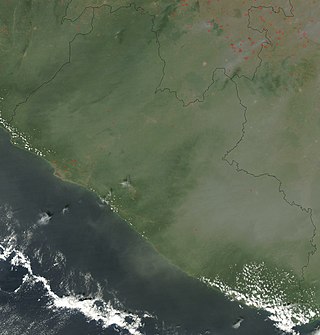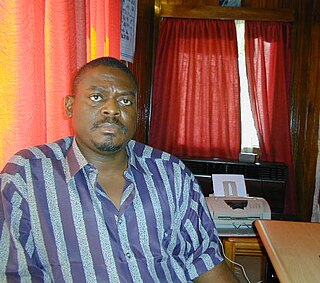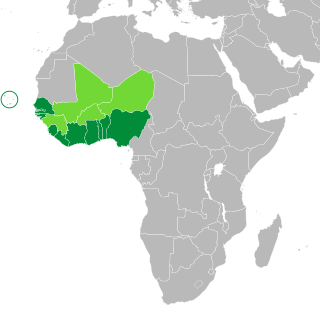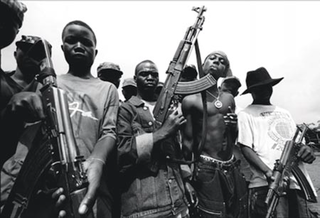Related Research Articles

Liberia is a sub-Saharan nation in West Africa located at 6 °N, 9 °W.

The Armed Forces of Liberia (AFL) are the armed forces of the Republic of Liberia. Tracing its origins to a militia that was formed by the first black colonists in what is now Liberia, it was founded as the Liberian Frontier Force in 1908, and retitled in 1956. For almost all of its history, the AFL has received considerable materiel and training assistance from the United States. For most of the 1941–89 period, training was largely provided by U.S. advisers, though this assistance has not prevented the same generally low levels of effectiveness common to most of the armed forces in the developing world.

Samuel Kanyon Doe was a Liberian politician and military officer who served as the 21st President of Liberia from 1986 to 1990. He ruled Liberia as Chairman of the People's Redemption Council (PRC) from 1980 to 1986 and then as president from 1986 to 1990.
The Krahn are an ethnic group of Liberia and Ivory Coast. This group belongs to the Kru language family and its people are sometimes referred to as the Wee, Guéré, Sapo, or Wobe. It is likely that Western contact with the Kru language is the primary reason for the development of these different names.

Prince Yormie Johnson is a Liberian politician and former warlord who has served as a senator for Nimba County since 2006. A former rebel leader, Johnson played a prominent role in the First Liberian Civil War.

Major Johnny Paul Koroma was a Sierra Leonean military officer who was the head of state of Sierra Leone from May 1997 to February 1998.

The First Liberian Civil War was the first of two civil wars within the West African nation of Liberia which lasted between 1989 and 1997. President Samuel Doe's regime of totalitarianism and widespread corruption led to calls for withdrawal of the support of the United States, by the late 1980s. The National Patriotic Front of Liberia (NPFL) led by Charles Taylor invaded Liberia from the Ivory Coast to overthrow Doe in December 1989 and gained control over most of the country within a year. Doe was captured and executed by the Independent National Patriotic Front of Liberia (INPFL), a splinter faction of the NPFL led by Prince Johnson, in September 1990. The NPFL and INPFL fought each other for control of the capital city, Monrovia and against the Armed Forces of Liberia and pro-Doe United Liberation Movement of Liberia for Democracy. Peace negotiations and foreign involvement led to a ceasefire in 1995 but fighting continued until a peace agreement between the main factions occurred in August 1996. Taylor was elected President of Liberia following the 1997 Liberian general election and entered office in August of the same year.

The Economic Community of West African States Monitoring Group (ECOMOG) was a West African multilateral armed force established by the Economic Community of West African States (ECOWAS). ECOMOG was a formal arrangement for separate armies to work together. It was largely supported by personnel and resources of the Nigerian Armed Forces, with sub-battalion strength units contributed by other ECOWAS members — Ghana, Guinea, Sierra Leone, The Gambia, Liberia, Mali, Burkina Faso, Niger, and others.

The Second Liberian Civil War was a civil war in the West African nation of Liberia that lasted from 1999 to 2003.
The Sierra Leonean Civil War (1991–2002) was a civil war in Sierra Leone that began on 23 March 1991 when the Revolutionary United Front (RUF), with support from the special forces of Liberian dictator Charles Taylor's National Patriotic Front of Liberia (NPFL), intervened in Sierra Leone in an attempt to overthrow the Joseph Momoh government. The resulting civil war lasted almost 11 years, and had over 50,000, up to 70,000, casualties in total; an estimated 2.5 million people were displaced during the conflict.
The National Patriotic Front of Liberia (NPFL) was a Liberian rebel group that initiated and participated in the First Liberian Civil War from 24 December 1989 – 2 August 1997. The NPFL emerged out of rising ethnic tensions and civil unrest due to the Liberian government that was characterized by totalitarianism, corruption, and favoritism towards ethnic Krahns. The NPFL invaded Liberia through Ivory Coast’s border with Nimba County in Liberia under the direction of Charles Taylor, a former Liberian politician and guerrilla leader who served as the 22nd president of Liberia from 2 August 1997 until his resignation on 11 August 2003.

The Independent National Patriotic Front of Liberia (INPFL) was a rebel group that participated in the First Liberian Civil War under the leadership of Prince Johnson. It was a breakaway faction of the National Patriotic Front of Liberia (NPFL).

The United Nations Mission in Liberia (UNMIL) was a United Nations peacekeeping operation established in September 2003 to monitor a ceasefire agreement in Liberia following the resignation of President Charles Taylor and the conclusion of the Second Liberian Civil War (1999–2003). At its peak it consisted of up to 15,000 UN military personnel and 1,115 police officers, along with civilian political advisors and aid workers.

The Cestos River, also known as Nuon or Nipoué river, is a Liberian river that rises in the Nimba Range of Guinea and flows south along the Ivory Coast border, then south-west through tracts of Liberian rain forest to empty into a bay on the Atlantic Ocean where the town of Cestos is located. The pygmy hippopotamus is known to inhabit lands along stretches of the river. It forms the northern third of the international boundary between Liberia and Ivory Coast.

United Nations Security Council resolution 866, adopted unanimously on 22 September 1993, after reaffirming resolutions 813 (1993) and 856 (1993), the council noted that United Nations involvement would contribute significantly to the effective implementation of the peace agreement in Liberia and went on to establish the United Nations Observer Mission in Liberia (UNOMIL).

Abdul Aziz One Mohammed was military governor of Borno State, Nigeria, and later was leader of the ECOMOG peacekeeping force in Liberia and Sierra Leone.

Rivercess County is a county in the south-central portion of the West African nation of Liberia. One of 15 counties that compose the first-level of administrative division in the nation, it has six districts. Cesstos City serves as the capital with the area of the county measuring 2,160 square miles (5,600 km2). As of the 2008 Census, it had a population of 71,509, making it the second least populous county in Liberia after Grand Kru County.

The Liberia national transitional government was a provisional government, or rather the name given to three successive governments, in Liberia formed in the midst of the First Liberian Civil War. The LNTG was product of the July 25, 1993, Cotonou Peace Accord, whereby the Interim Government of National Unity disbanded. The respective LNTG-I, LNTG-II and LNTG-III governments were differentiated by being led by three different chairpersons. Initially supposed to last for six months to allow for disarmament of warring factions and preparations of national elections, the LNTG timeline lasted until mid-1997. Various of the warring factions had direct participation in the LNTG and civilian elements were gradually sidelined. Through participation in the provisional governance of LNTG the different warlords could gain access to state resources, even in situations when armed hostilities continued. The LNTG period ended with the 1997 Liberian general election whereby Charles Taylor was elected President of Liberia.
Isaac Saye Musa was a Liberian military official and politician. Musa was one of the top field commanders of National Patriotic Front of Liberia (NPFL) in the First Liberian Civil War. He served in government functions in the transitional governments during the 1990s. A noted loyalist of Charles Taylor, Musa would eventually fall out of favour with Taylor.
Joseph W. Mulbah (1956–2011) was a Liberian journalist and politician. He served as Minister of Information, Culture and Tourism and Minister of Transport.
References
- ↑ "Rivercess Falls to Allied Forces". Monrovia Daily News, 1993-05-10, 1/6.
- ↑ "Good Sign of Gold in Rivercess, AMLib Declares as Citizens Make Major Demands Archived February 29, 2012, at the Wayback Machine ", Liberian Observer, 2012-02-20. Accessed 2012-06-03.